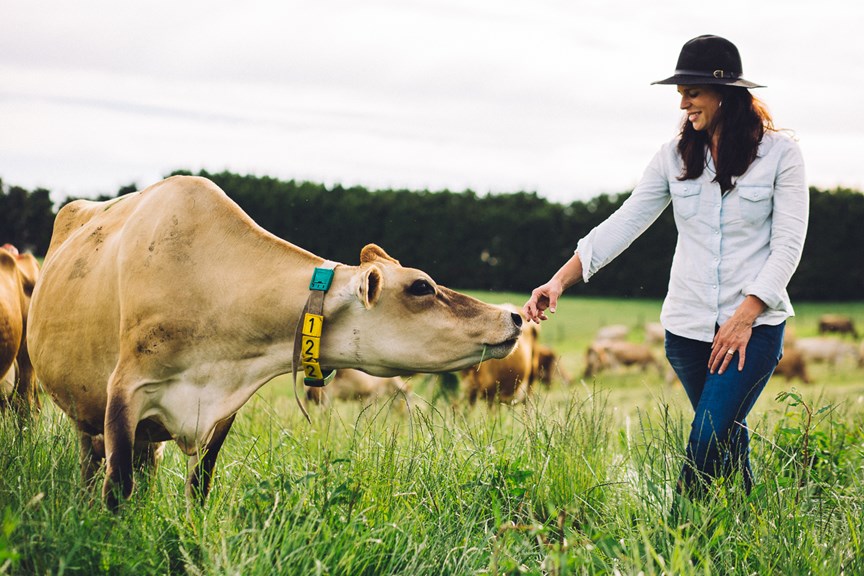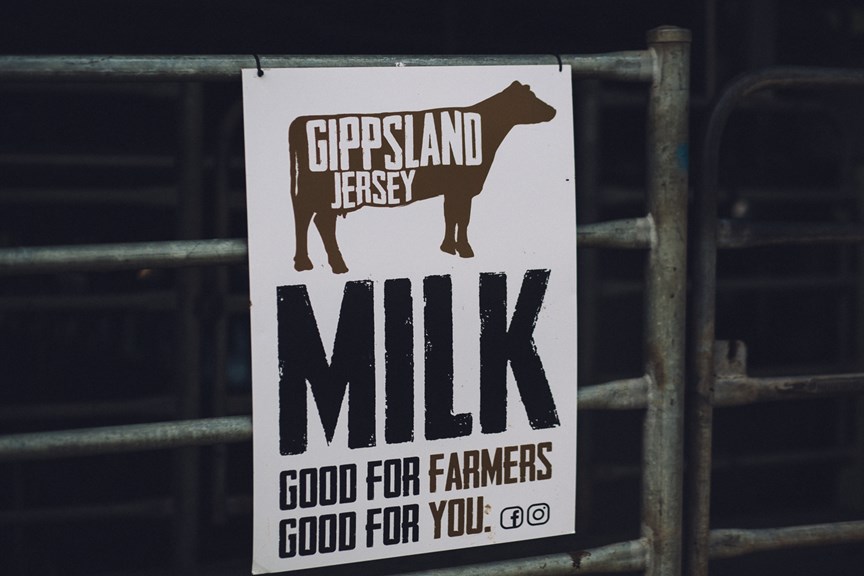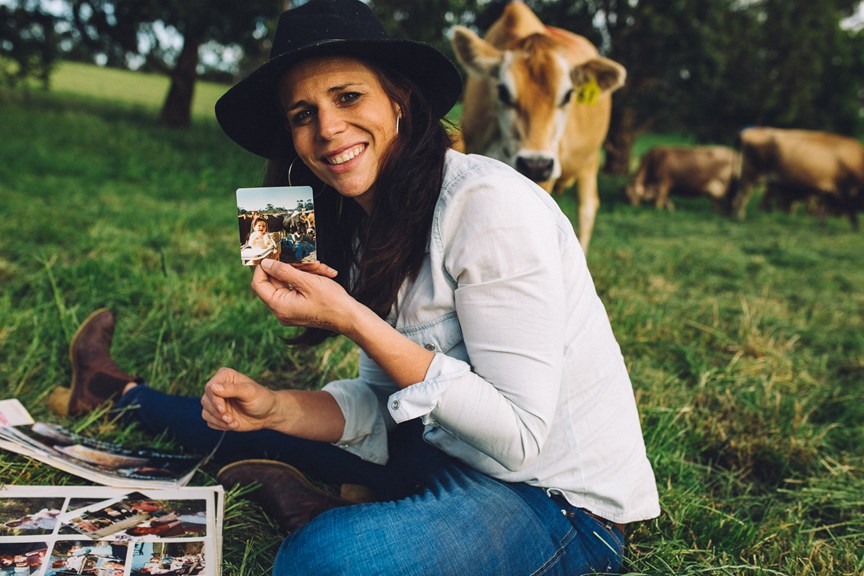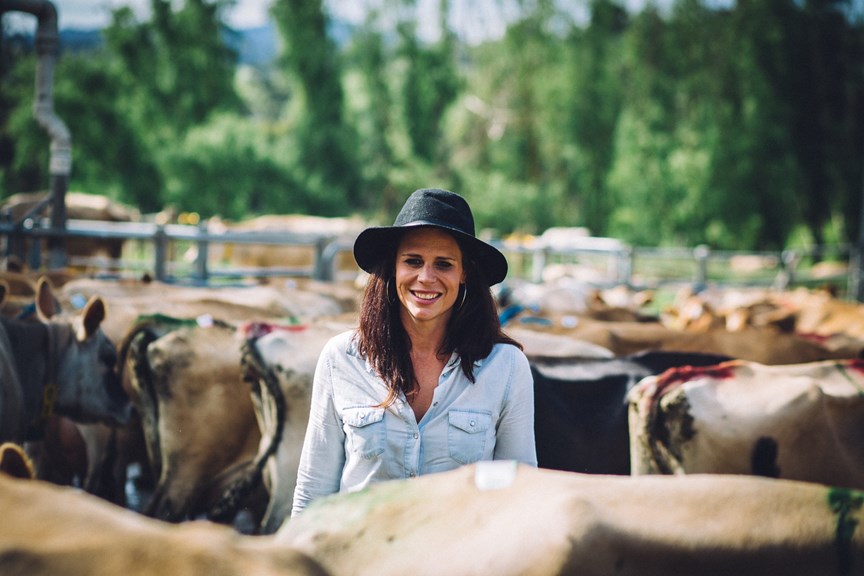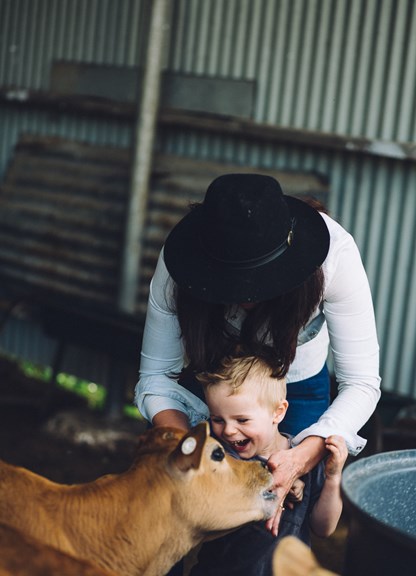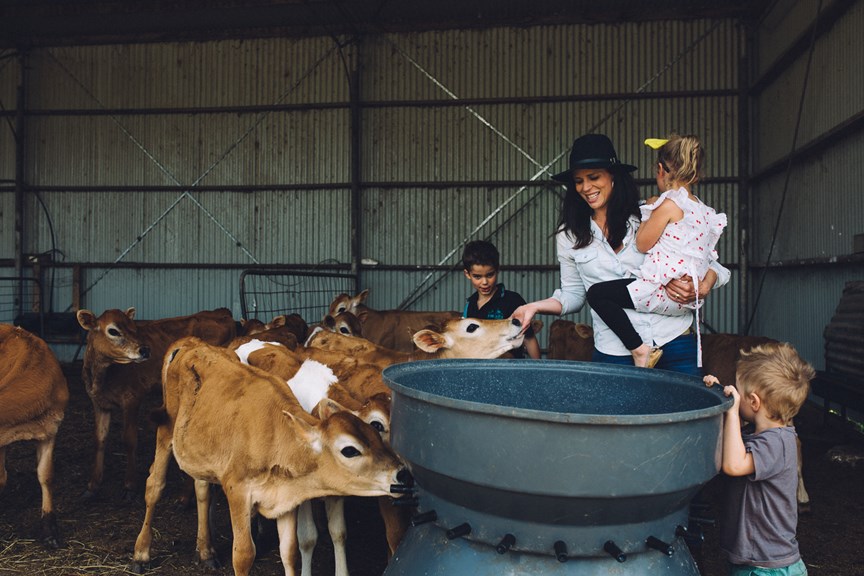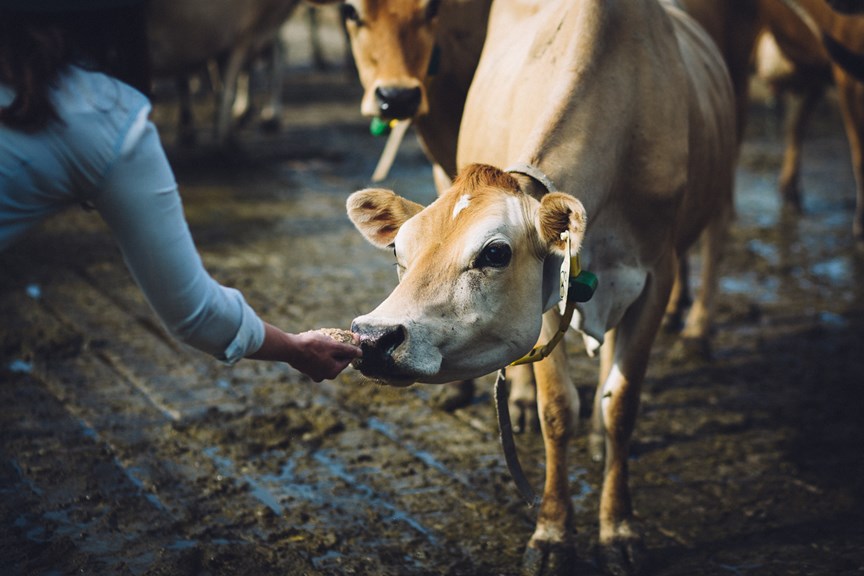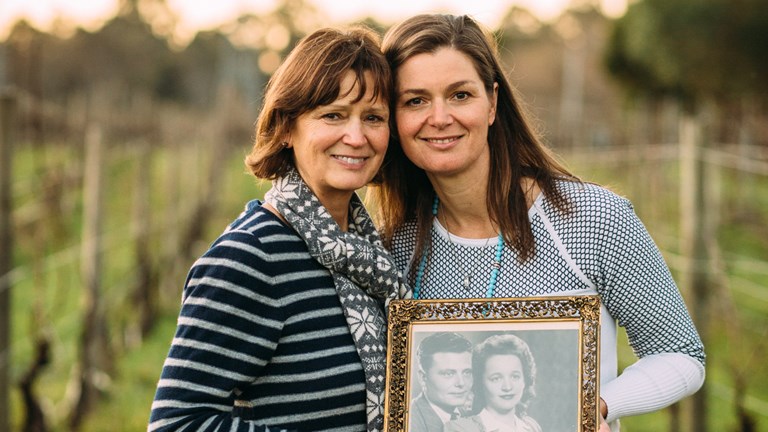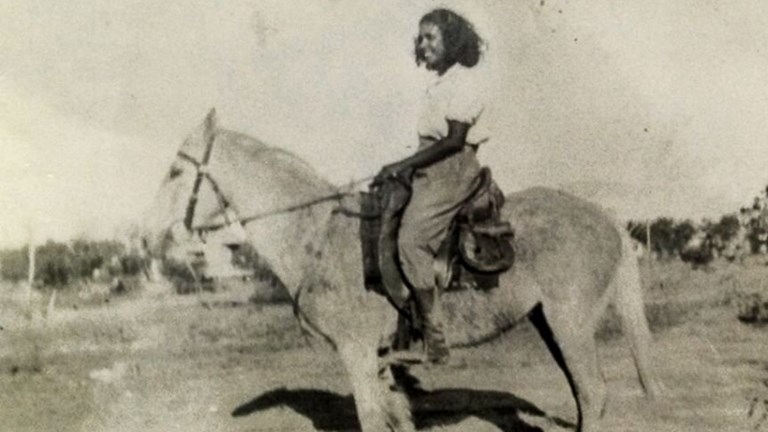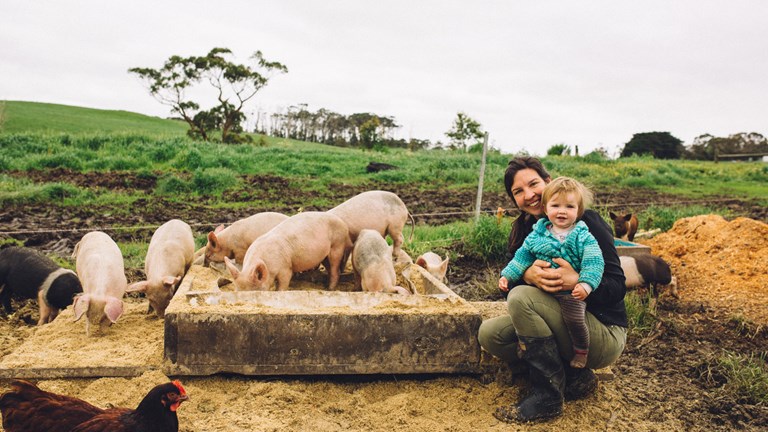The resilience of Sallie Jones
The Victorian dairy farmer overcoming family tragedy, bushfires and the COVID-19 pandemic.
Dairy farmer Sallie Jones was on the cusp of a major business venture when it was derailed by a catastrophic summer of bushfires. That was before COVID-19 struck.
The venture—a milk processing factory in Lakes Entrance—required an official inspection. But the authorities who needed to sign off on the project had been directed not to go into a bushfire zone.
The huge interest rates on her loans started to mount.To Sallie, it felt ludicrous, ridiculous even.
‘Of course we're not going to tell people not to come to East Gippsland. Of course we want people to come!,’ Sallie said in an interview recorded in May, 2020.
‘But then, literally, it was like a week or two later that we're in lockdown.’
Already struggling, Sallie’s dairy business lost a quarter of its trade overnight as cafes and restaurants cancelled their milk orders.
It must have felt a perfect storm. But Sallie had weathered far worse before.
In the midst of the milk crisis of 2016, Sallie’s dairy-farming father, Michael Bowen, ended his life.
To honour his legacy, Sallie and her business partner, Steve Ronalds, founded an independent milk label, Gippsland Jersey. The outfit is based on three pillars—kindness, a fair price for farmers and challenging mental health stigmas.
So in the wake of a catastrophic fire season and the midst of a pandemic, Sallie saw an opportunity.
‘We just got creative and went: how can we make the most of this terrible situation?’Sallie Jones
As they have for so many businesses, social media and home delivery provided an answer.
‘Having our own channel essentially has been awesome,’ Sallie said.
‘People have turned around wanting to support Australian manufacturing and Australian-owned.’
There are downsides to the new model; Sallie misses the connection and conversations with customers, giving out product samples, taking on foreign workers.
But Sallie has also found that the emerging paradigm is helping her overcome the tyranny of distance. All of a sudden, ‘attending’ a business meeting with people in Melbourne or Sydney via video calls is no longer out of the ordinary.
‘It's more socially accepted these days which is super cool for us because it takes out that geographic distances,’ she says.
Sallie’s ability to see the silver lining in a crisis was instilled in her from a young age. In 2016, as part of the Invisible Farmer Project for Museums Victoria, Catherine Forge visited for her Jindivick farm to learn more about her story.
Sallie’s story
Story excerpt from a blog post published by the Invisible Farmer Project in 2017.
Having grown up on a value-adding dairy farm in Lakes Entrance, Sallie describes her involvement in the dairy industry as more of a natural progression, or birthright, than a choice.
Thinking back on her early years, she remembers an idyllic childhood filled with countless memories. According to Sallie, farms are ‘emotional pieces of land that run down generations.’
It’s through these childhood memories that Sallie is able to maintain such a deep-seated connection to the landscape, her work, and the community.
‘It’s the landscape that triggers all the memories,’ she said.
‘My grandfather flew over in the war and saw that piece of land. He packed up his wife and drove from Adelaide over to Lakes Entrance, cleared the land and made it into a dairy farm – real pioneering stuff! I had a lot of responsibilities growing up on the farm.
‘For me, the memories are a mixture of having incredible freedom, having a really good work ethic, and being across a lot of things. When I go home to Lakes, as soon as I hit the dirt road and the wheels slap over the cattle grid, I know that I’m home. It’s always going to be home.
‘Once you’ve grown up with that, it’s hard to get it out of your blood; you’re very connected to the land once you’ve lived a childhood on it.’
While these experiences certainly helped to prepare Sallie for a life in the industry, she says that it was her father who really gave her the confidence and understanding needed to push the boundaries with Gippsland Jersey.
The mission
For Sallie and Steven, the central premise behind Gippsland Jersey was to pay tribute to Sallie’s father through a business model based on fairness and kindness.
In their minds, there were two main considerations to be made: 1) using clean and sustainable farming methods; and 2) providing support for other dairy farmers. Steve saw to the initial provision of milk from his herd of fourth-generation Jersey cows, and their impeccable genetics guaranteed beautiful milk.
The next task was to find someone to process their product.
‘We simply Googled processes. It’s funny because all of these names came up that Dad used to talk about. It kind of gave me respect when I walked into these meetings and said that I’m the daughter of Michael Bowen, which is amazing… Obviously we didn’t have a plan and we didn't know how it was going to pan out – but the power of social media. We simply launched Instagram and Facebook and told our story photo by photo. It was a steep learning curve, but now we’re eight weeks into the brand. It’s been a whirlwind.’
With the product and branding well underway, Sallie then focused her sights on what could be done to give back to the dairy farming community in order to support those undergoing industry hardships. For her, it all comes back to raising awareness around mental health issues:
What I’m trying to do in terms of Gippsland Jersey is talk about mental health and the importance of being open and having conversations. Medium sized farmers and small farmers are working on their own, so they’re not connected and they don’t have as many friendships or relationships. So when they do finish up farming, they don’t know what to do with themselves, which can often lead to mental health concerns – it certainly happened to my Dad. There’s a stigma around mental health, so just being able to smash that open and say, “Let’s have a conversation about suicide and the ripple effect through those communities and families.” It’s absolutely devastating and I feel that raising awareness around these issues is my purpose in life.
Gippsland Jersey is a force for positive change. By returning a portion their profits to the farming community, bringing other dairy farmers into their brand (paying a fair price for their milk), and advocating for mental health organisations like The Ripple Effect, Gippsland Jersey is able to help support the emotional wellbeing of their fellow dairy farming families:
It’s not about money, it’s about looking after our dairy industry. We can’t solve the dairy crisis but we can do our bit to inspire other people to think outside the square. Farmers have the power. Farmers have all the power. So for me, I feel like I’m just starting the journey of hopefully inspiring other farmers to stay in the game.
Connectivity
While the mission of Gippsland Jersey emphasises connections within the dairy farming community, Sallie also recognises the importance of connectivity between the producer and the consumer, and the farmer and the wider community. She first became involved in the networking scene earlier in life as a PR consultant. Having successfully completed a public relations course, Sallie was offered a position with a consumer-based consultancy firm where she engaged with journalists and mainstream media, and even advocated for the benefits of raw milk. Armed with a new vision for the branding trade, Sallie was inspired to launch her own PR and marketing consultancy.
By drawing upon a specialised skill-set, Sallie has been able to bolster the visibility of the Gippsland Jersey campaign, connect the consumer to the producer, and engage with the wider community:
I read a quote saying, ‘Your wealth is only as big as your connections, or your network.’ So over the last 15 years I’ve taken a genuine interest in people and I love connecting with people. I really feel as though people want to support farmers, but they don’t understand how they can do that – so, through farmers’ markets and the work that you do, to host conversations and give them experiences.
'For me it’s more about being able to tell those farming stories and being able to connect the consumer with the farmer. I was brought up with an understanding and a work ethic, and I understand the mentality of farmers. But then I also understand the consumers and what they would want to see and what they would want to hear. So, I guess I sit somewhere in the middle these days in terms of being a farmer. I’m a value-adding, marketing, storytelling farmer!'
Platforms like Facebook and Instagram have also materialised as essential tools for the Gippsland Jersey project. Social media is a game changer that has allowed farmers to share their stories with the wider community, and has given consumers an opportunity to get to know them:
To have a positive story emerging is exciting not just for the dairy farmers but also for the consumers. The consumers want to back something that’s good. So, for example, we had a crowdfunding run, and we raised over $32,000 from people donating their money for a milk truck. We called it The Milkshake Truck. For Gippsland Jersey, we need to grow our brand and grow the brand awareness, and we can only do that by getting ourselves out there. It’s not just about The Milkshake, it’s about the connections and about them seeing real farmers doing stuff that’s cool and inspiring younger farmers.
For those with an entrepreneurial spirit, social media offers a plethora of marketing and networking opportunities. In the case of Gippsland Jersey, Sallie and Steve have often welcomed cross-promotional collaborations in their branding strategies by sharing other people’s stories; and as an advocate for social media, Sallie encourages farmers to take full advantage of these collaborative opportunities – ‘Don’t do it solo. Find people that can help you on your journey.’
Women’s voices
What Sallie has been able to achieve with Gippsland Jersey is no small feat. Weathering through hardship and tragedy, she has taken up the mantel for positive change in ensuring fairness and kindness in the dairy industry. Reflecting on where she is today, Sallie takes a moment to share her personal experience as a woman in the industry:
'When I was young, the men’s voices were always the loudest; but it was the women – my nana and my mum – that had the most impact in terms of really being able to get stuff done behind the scenes. My attitude has matured over the years and I think there is definitely a spot for women’s voices to be heard really loudly now, whereas I don’t think it was when I was growing up. You know, Mum didn’t necessarily have the confidence to ever take the front role; she always let Dad do that. So, I’ve had to push that boundary for myself to say that it’s okay for me to have a voice.
'I guess I’ve been surrounded by some pretty powerful women that have shown me how to do that. It’s not necessarily something that’s been in my family – I’ve had to go out and learn how to assert myself with my own female voice, and develop my own style on how that happens. Especially in the dairy industry; it’s quite a male-dominated field, so there’s not many women doing things. I know I’ve got a strong self-identity and I know who I am; well I’m still learning who I am, but I guess I feel like I know my purpose. I’ve got the freedom, I’ve got my feet grounded, and I’m okay – I’m not shaky in that.'
By openly sharing her journey with the world, Sallie is recognised as a role model for the younger generation of women farmers. Holding to a deep sense of responsibility to her community, Sallie has expressed her hopes of being a living resource for these young women by offering them advice and helping them to find their own voice:
For me, I hope to be able to mentor younger women and give them confidence. I know that they’re looking to me and seeing how the story rolls out, and hopefully it will inspire them to do something that’s outside of the box. Farming isn’t what it used to be. So, by offering that insight and showing what can be done, I’m very happy for my life to be an open book and let them see how that plays out. So I don’t know what’s going to happen tomorrow – I’m just on this crazy journey and it’s very exciting.
If you or someone you know is struggling with mental health concerns, please seek help via organisations such as Beyond Blue, the Ripple Effect or Lifeline.
This article is based on an interviews by Nicholas Crotty in 2020 and Catherine Forge in 2016 with Sallie Jones. These interviews form part of Museum Victoria’s Invisible Farmer Project and Collecting the Curve collections.
